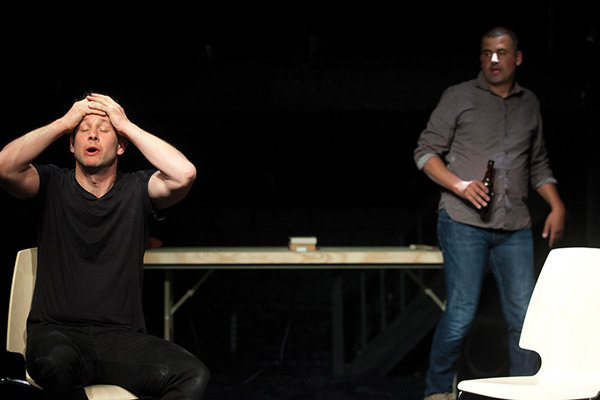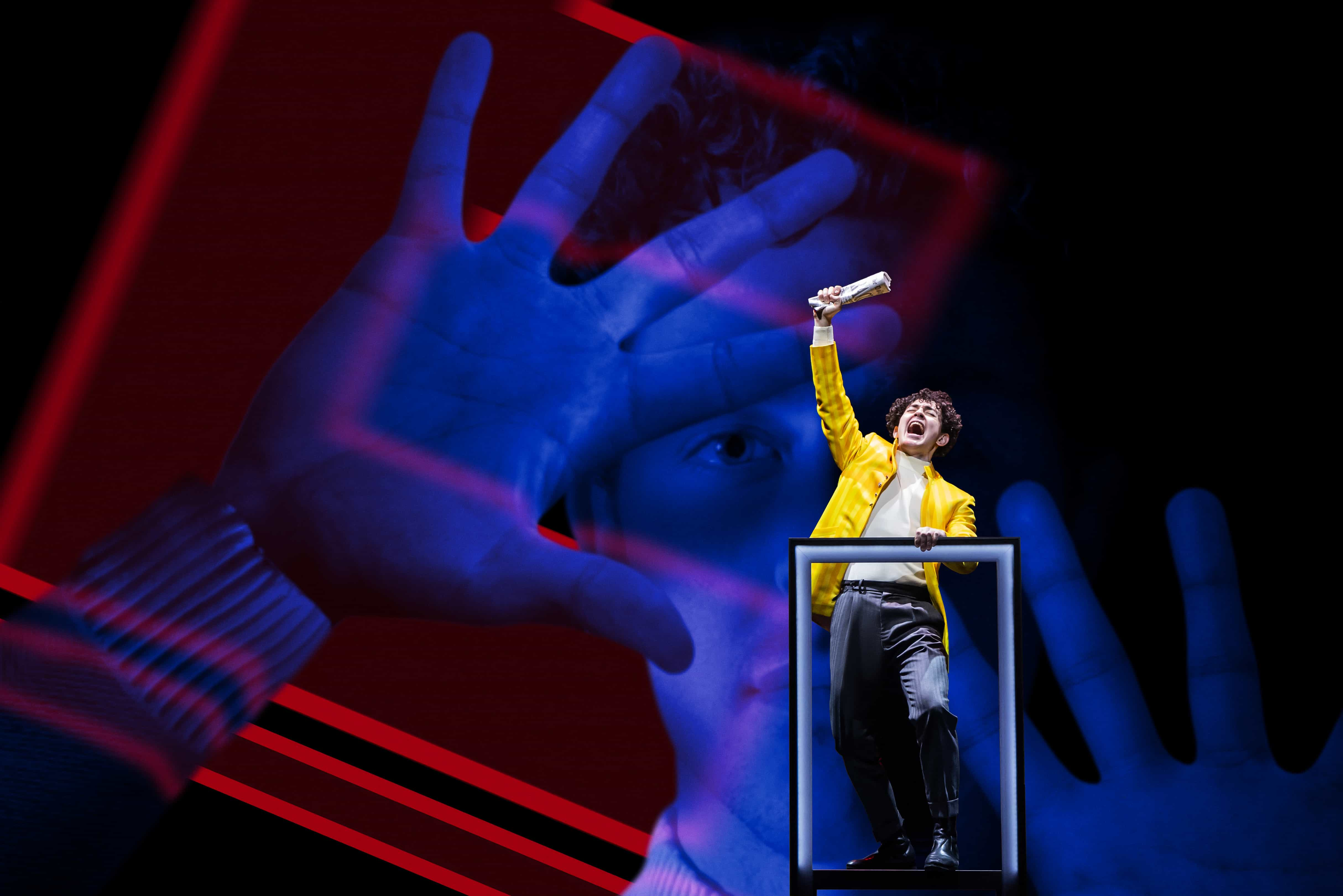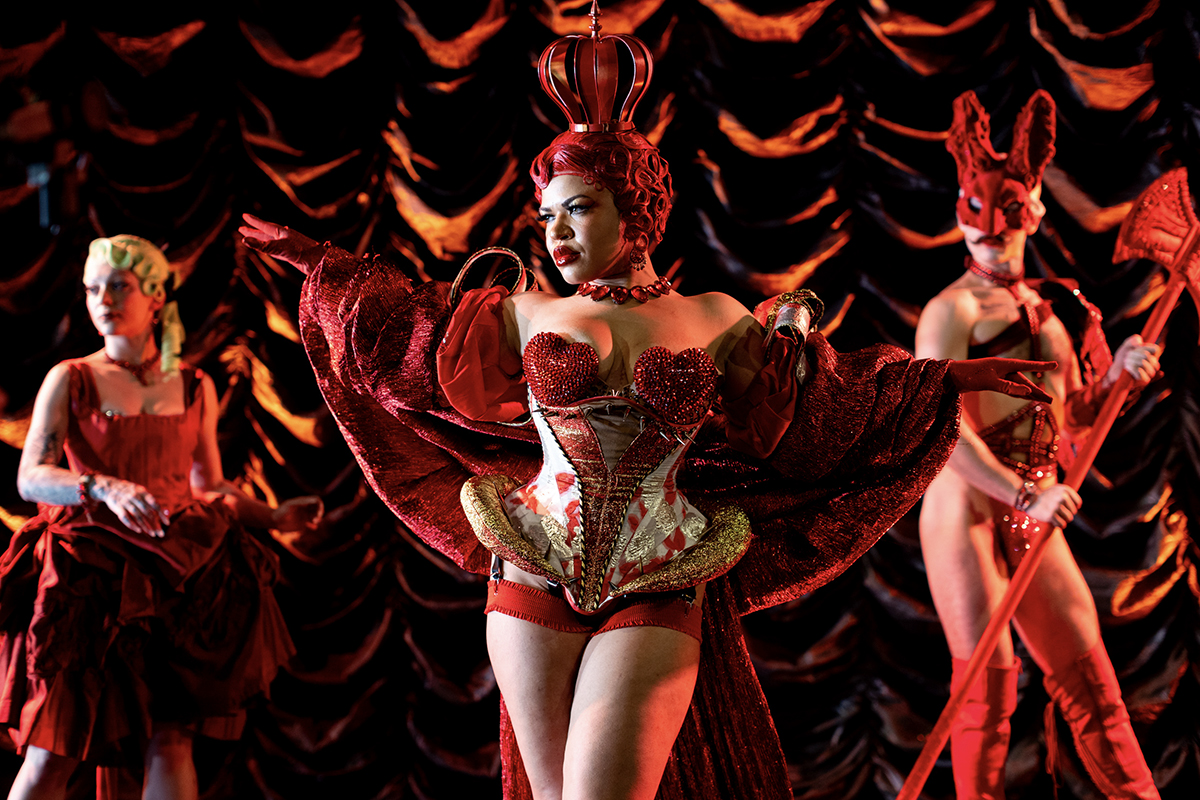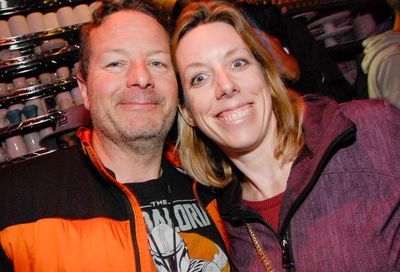Table Talk: “Winners and Losers” (review)
Winners and Losers is like being trapped in the boring room at the party

A cross between a performance piece and a semi-comedic two-man play, Winners and Losers (![]()
![]() ) is an interesting hybrid, but one that suffers from its chimeric nature and apparent reliance on the real-life energy of the performers.
) is an interesting hybrid, but one that suffers from its chimeric nature and apparent reliance on the real-life energy of the performers.
Set as a conversation between the playwright-performers Marcus Youssef and James Long, the overall impression is one of being witness to a couple of intense friends who think their conversation is the most interesting one in the room. As they engage in an opinion game they dub “Winners and Losers,” they fall into an argument that becomes increasingly personal, one in which each man begins to challenge the other’s integrity, class values and family relationships.
The concept is undoubtedly interesting: how close friends work instinctively to deflect or compensate for deep-seated differences and what happens when these mechanisms, whether by accident or choice, begin to fail. Can friendships survive such ruptures? Or does the unmasking of differences amount to a fatal betrayal?
The exploration of this idea alone could have made for a compelling play. But, for reasons of experimentation — and perhaps to challenge other concepts of “theater” — the playwrights have opted to make their exploration in something of a blended format.
Although there is an arc here, instead of fully-scripted dialogue the performers use improv and a partial script to move through the progression that leads to conflict and confrontation. It’s a challenging structure, one that requires the performers to seamlessly express the spontaneous while keeping their eye on the ball — a ball they must also move inexorably forward. One can see what they are striving for: the improv does bring an interesting unpredictability — a facsimile of what it is like to witness an intimate conflict — but it never quite comes off. The transitions are sometimes awkward, the contrivances sometimes too obvious.
Another choice that colors the experience is the ongoing question of how much presented is real versus fictional. It arrives with the opening game of “Winners and Losers,” delivered as an improv exercise that also introduces insights into the performers/characters. As the game segues into conversation and argument, the question continues to hang in the air: are we seeing the real men or are they playing personas?
It is a tantalizing concept, but one that is confused by the performances themselves. Ironic though this may sound, neither performer is wholly convincing, whether they are being themselves or not. Sometimes the performers feel “real,” other times they are far too “actorly.” Also under-realized are the dynamics of the friendship. Although their initial trepidation as they begin to enter dangerous territory is well conveyed, the actual confrontational points often feel forced. With this much embedded improv, so much of its energy relies on the actor’s personal energy. The dynamic here simply doesn’t sing.
Matters are not helped by the level of discourse. The piece raises questions of class, money, family consciousness and, ultimately, friendship. But the content never truly gels. Some of the jokes are funny, but many are pedestrian. Some of the class differences raised ring with truth, others feel utterly contrived. Though there is politics and history, both add little dimension to the picture being painted. Most of the subject matter explored won’t be a revelation to anyone who has been knocking around college or adult life. The monologues may be based on reality, but they lack the integrity and intensity of the 3 a.m. friend-confessional.
Overall, Marcus Youssef does the best job of creating a convincing persona (whether his own or not) of an Egyptian-American with lefty leanings and angst. He is, at times, compelling in his worry and his insecurities. James Long is less convincing in conveying his working-class American roots and past family conflict. If everything he says is true, he has left far too much out about how he has evolved into what we see on this stage.
And that is yet another challenge in this ambitious piece. Maybe one is meant to question the authenticity, maybe the stories are real but the performers have traded them, maybe they have created just enough confusion to encourage an audience to read whatever they want into the construct. But whatever the goals, there shouldn’t be room for this much guessing. A simpler structure — a two-man play — may not have offered the edginess of witnessing a “real” confrontation, but it might have allowed greater cohesion, depth and exploration. It might also have allowed for some far more uncomfortable truths and questions. The atypical format may be cerebrally interesting, but in the arena of live performance the elements cancel each other out.
Ultimately, however one views this — as a performance piece that toys with the conventions of theater, or theatre that toys with elements of performance — it will all come down to whether you find these two men and their angst interesting. For those who savor precision wit, think tank talk, and remember Spalding Gray with fondness, this is going to feel less like an evening in provocative company and more like being trapped in the boring room at the party.
Winners and Losers runs to November 22 at Woolly Mammoth Theatre Company, 641 D St NW. Tickets are $35 to $68. Call 202-393-3939 or visit woollymammoth.net.
Support Metro Weekly’s Journalism
These are challenging times for news organizations. And yet it’s crucial we stay active and provide vital resources and information to both our local readers and the world. So won’t you please take a moment and consider supporting Metro Weekly with a membership? For as little as $5 a month, you can help ensure Metro Weekly magazine and MetroWeekly.com remain free, viable resources as we provide the best, most diverse, culturally-resonant LGBTQ coverage in both the D.C. region and around the world. Memberships come with exclusive perks and discounts, your own personal digital delivery of each week’s magazine (and an archive), access to our Member's Lounge when it launches this fall, and exclusive members-only items like Metro Weekly Membership Mugs and Tote Bags! Check out all our membership levels here and please join us today!


























